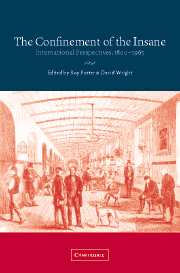Book contents
- Frontmatter
- Contents
- List of figures
- List of tables
- Notes on contributors
- Acknowledgements
- Introduction
- 1 Insanity, institutions and society: the case of the Robben Island Lunatic Asylum, 1846–1910
- 2 The confinement of the insane in Switzerland, 1900–1970: Cery (Vaud) and Bel-Air (Geneva) asylums
- 3 Family strategies and medical power: ‘voluntary’ committal in a Parisian asylum, 1876–1914
- 4 The confinement of the insane in Victorian Canada: the Hamilton and Toronto asylums, c. 1861–1891
- 5 Passage to the asylum: the role of the police in committals of the insane in Victoria, Australia, 1848–1900
- 6 The Wittenauer Heilstätten in Berlin: a case record study of psychiatric patients in Germany, 1919–1960
- 7 Curative asylum, custodial hospital: the South Carolina Lunatic Asylum and State Hospital, 1828–1920
- 8 The state, family, and the insane in Japan, 1900–1945
- 9 The limits of psychiatric reform in Argentina, 1890–1946
- 10 Becoming mad in revolutionary Mexico: mentally ill patients at the General Insane Asylum, Mexico, 1910–1930
- 11 Psychiatry and confinement in India
- 12 Confinement and colonialism in Nigeria
- 13 ‘Ireland's crowded madhouses’: the institutional confinement of the insane in nineteenth- and twentieth-century Ireland
- 14 The administration of insanity in England 1800 to 1870
- Index
3 - Family strategies and medical power: ‘voluntary’ committal in a Parisian asylum, 1876–1914
Published online by Cambridge University Press: 24 July 2009
- Frontmatter
- Contents
- List of figures
- List of tables
- Notes on contributors
- Acknowledgements
- Introduction
- 1 Insanity, institutions and society: the case of the Robben Island Lunatic Asylum, 1846–1910
- 2 The confinement of the insane in Switzerland, 1900–1970: Cery (Vaud) and Bel-Air (Geneva) asylums
- 3 Family strategies and medical power: ‘voluntary’ committal in a Parisian asylum, 1876–1914
- 4 The confinement of the insane in Victorian Canada: the Hamilton and Toronto asylums, c. 1861–1891
- 5 Passage to the asylum: the role of the police in committals of the insane in Victoria, Australia, 1848–1900
- 6 The Wittenauer Heilstätten in Berlin: a case record study of psychiatric patients in Germany, 1919–1960
- 7 Curative asylum, custodial hospital: the South Carolina Lunatic Asylum and State Hospital, 1828–1920
- 8 The state, family, and the insane in Japan, 1900–1945
- 9 The limits of psychiatric reform in Argentina, 1890–1946
- 10 Becoming mad in revolutionary Mexico: mentally ill patients at the General Insane Asylum, Mexico, 1910–1930
- 11 Psychiatry and confinement in India
- 12 Confinement and colonialism in Nigeria
- 13 ‘Ireland's crowded madhouses’: the institutional confinement of the insane in nineteenth- and twentieth-century Ireland
- 14 The administration of insanity in England 1800 to 1870
- Index
Summary
Recent research in the history of nineteenth-century psychiatry has explored the expanding powers of the medical profession and the proliferation of the asylum, that ‘magic machine’ for curing insanity. This medicalization of madness has usually been portrayed as a ‘top-down’ process: ‘social control imposed from above with greater or lesser success on a population now the unwitting object of medical encadrement’. But as historians have begun to study individual asylums and the complexities of committal, more emphasis is being placed on the role played by families in the process. Asylum doctors, it has been suggested, merely confirmed a diagnosis of insanity already made by families, by neighbours, or by non-medical authorities. Consequently, as the American historian Nancy Tomes has argued, ‘the composition of a nineteenth-century asylum population tells more about the family's response to insanity than the incidence or definition of the condition itself’. Such arguments imply a more ‘dynamic and dialectical’ interpretation of the process of medicalization, one that requires a careful assessment of family demands for medical services and the degree to which these demands were met, willingly or unwillingly, by the emerging psychiatric profession. Asylum records, although difficult to interpret, can shed some light on family decisions to ‘take the road to the asylum’; this is particularly true in the case of so-called voluntary committal, where families could avoid the involvement of the police or judicial authorities.
- Type
- Chapter
- Information
- The Confinement of the InsaneInternational Perspectives, 1800–1965, pp. 79 - 99Publisher: Cambridge University PressPrint publication year: 2003
- 5
- Cited by



